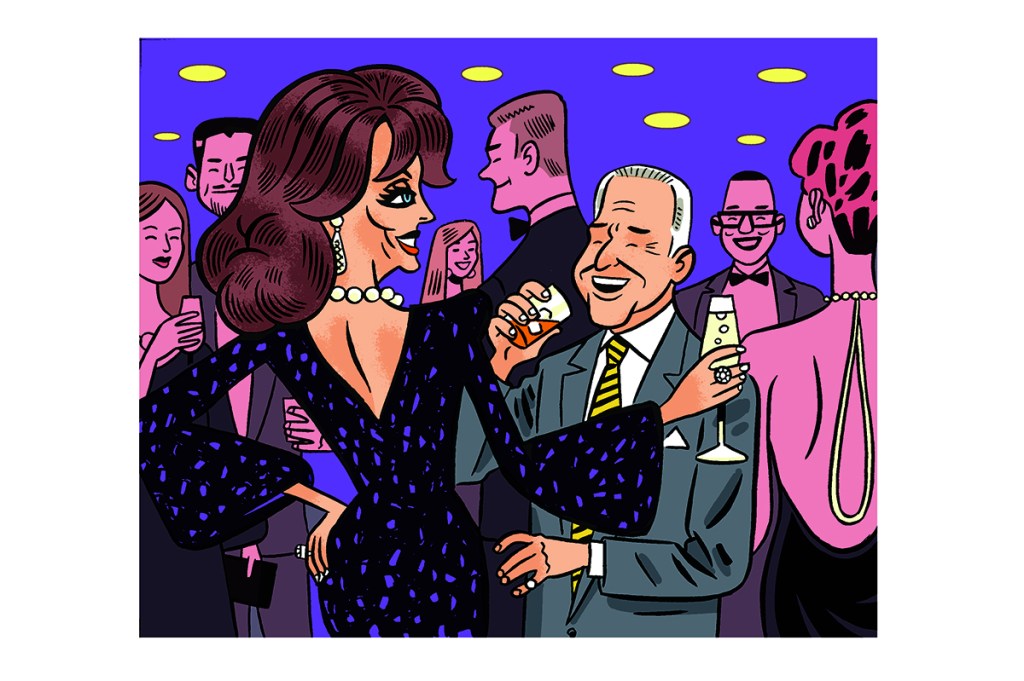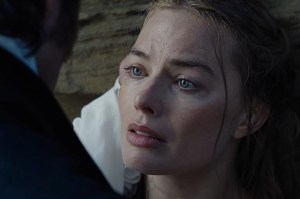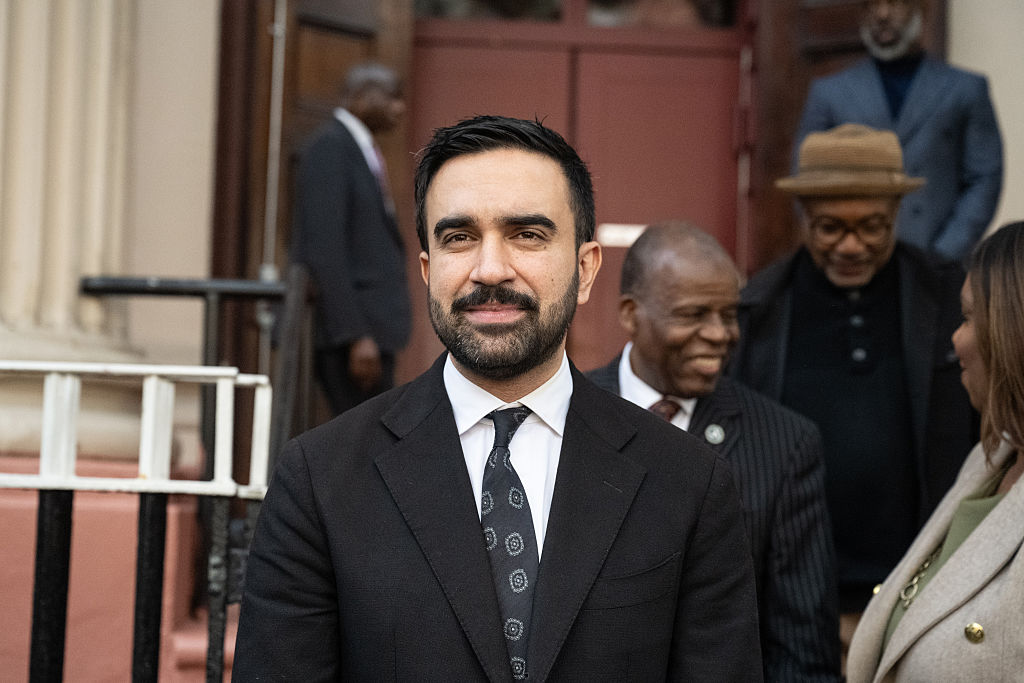Introductions
Scene: a drawing room in London. When the recording starts, Taki is already mid-anecdote…
Taki: I was sent out to Monte Carlo to speak to Roger Moore. The Spectator offered to pay all my expenses. I said thank you, I’ll pay my own. I went and had a terrific drunken dinner with Roger who really spilled the beans, cos we were buddies. I came back. The tape was empty because I’d never turned the recorder on.
Joan: I’d known Roger since I was fifteen, because my father was a big agent in London and I came back from school — oh, fourteen actually, because I left school at fifteen — and there’s the most gorgeous man I’ve ever seen standing there. He came over and said, “How do you do? You must be Joan, my name is Roger Moore.” And I said, “Hello, how are you? What’s that screeching in the background from Daddy’s office?” And he said, “Oh that’s my wife. Your father’s trying to get her to go on tour and she doesn’t want to do it.” Her name was Dorothy Squires, who you might’ve known.
Taki: Of course!
Joan: Famous for being rather loudmouthed, let us say.
Taki: The third wife, Luisa — she and I became friends. She spoke no language but Italian. One day after I came out of Pentonville University, Bill Buckley had rented the Château de Rougemont to give a party for me, so I arrived there and Roger and Luisa were coming out of the car. Luisa in a loud voice said, “Roger, Roger, è questo, chi uscito di prigione [that’s the man who just came out of prison].” Roger turned around to shush her and he hit his head on this enormous gate and knocked himself out. And there I was, so Pat Buckley came down and said, “My God, Taki, we can’t take you anywhere! You come out of jail and you knock out Roger Moore!” Of course Roger and I were great friends. He used to tell me all these jokes, oh you know Roger.
Joan: Oh, I know! Some of them were a bit stale after a while… But people used to make outrageous jokes! I mean, I grew up going to variety theaters all the time. Then I went to America and there was Milton Berle and Don Rickles, all politically incorrect…
Taki: They were all Jewish and they were all the best, of course. The best was Jackie Mason. He said, “You know how you can tell the Christians in this town? How? They wait in line.” But Joan, you can’t tell jokes anymore.
Joan: No, you can’t. And that’s wokeness (and such a weird word, wokery, wokeness). The problem is that you can’t have an opinion about anything. I don’t wish to get canceled.
Taki: Except, Joan, you should cancel them!
Joan: Saturday Night Live used to be hysterically funny and very politically incorrect. Now it’s sacrificed humor for wokeness.
Taki: Completely.
Joan: I haven’t been to America for about six months now, but I’ve certainly seen this country [Britain] become more humorless.
Taki: I think in academic circles it’s just as bad here as it is over in America. In society I think it’s worse over there. I went to an opening last night. A friend had an exhibition and I was being a drunk and I was saying terrible things and nobody told me to shut up. In New York I’m much more careful. Here I was surrounded by friends, and you know the English have a sense of humor. In America all you hear is, “What do you mean by that?” Especially from women: “What do you mean by that?” What do you think I mean?
Joan: What I find really sad is the people — I don’t know who these people are — who are going into libraries and schools and universities and colleges and saying you can’t say that in this book, children’s books even, and canceling things. They haven’t got to Shakespeare and Shaw yet but they will. People say to me, “Why do you want to call yourself an actress? It’s not politically correct.” I say: “Are you kidding? It’s not politically correct? Why? I will call myself an actress to my dying day.”
Taki: Sorry to interrupt you, Joan, but you’re so right. The idea to hear a beautiful woman say “Yeah, I’m an actor” — ha! Really, are you in drag? An actress is an actress!
Joan: Help yourself to more wine.
Taki: We’re starting early!
First Meeting
Taki: I was thinking, you know, that we went out on two dates. The last date was thirty-one years ago. We went to Annabel’s, the two of us, and then I tried to kiss you, and you said, “I’m in a relationship.” So when I read in your book your thing about Robin Hurlstone I said, “Who’s that asshole?” But the date before was sixty-four years ago…
Joan: Didn’t you also have a fight with Nicky Hilton in the lobby in the Plaza?
Taki: Over you! Over you! It was 1957! Do you believe this crap? We’re still around!
Joan: A real fistfight! Two young men brawling over me!
Taki: He was tough.
Joan: I was very flattered. And you had just bought me something. A little anchor covered in diamonds, very lovely it was. I think your father liked me.
Taki: Who do you think put up the money for that?!
Joan: I think Nicky was a bit of a…
Taki: … shithead.
Joan: A bit of a broken record, yes.
Taki: Yes. He used to beat up Elizabeth Taylor.
Joan: My aunt Pauline was on the beach opposite the Carlton when they were on honeymoon in 1950 and she saw him slap her around. I knew Elizabeth quite well; she was very funny. When I got divorced from Peter Holm, my fourth husband, she sent me over a note which said: “I’m still ahead by three!”
Taki: That’s very funny.
Joan: I did her last film, you know, and she was not well. She could hardly walk, and she was playing an agent. It was with Shirley MacLaine and Debbie Reynolds. We were three actresses, dancers and she was our agent, she was playing Sue Mengers, did you ever meet Sue Mengers?
Taki: She wrote me a letter when I was in prison.
Joan: You knew Sue?!
Taki: I didn’t know her. She wrote me a letter when I went to Pentonville, wishing me well and saying when you come out, come and see me. I never did, but that was very kind of her. I’m sure somebody told her there was a nice guy who was in Pentonville, having advanced studies, so she wrote to me.
Joan: She was like that. She didn’t care what she said. I knew her when she was a secretary at William Morris and she became very friendly with Tony Newley —
Taki: Your husband.
Joan: Yes. We used to invite her to Montauk. I was pregnant, I was pregnant the whole time, and she used to come, we had a lot of gay friends and she would sunbathe in the nude, and…
Taki: And a lot of people became gay.
Joan: … she didn’t care. She was very pretty.
Taki: Well, anyway, when I read your memoirs, you said that after you broke up with that asshole Robin Hurlstone the Bamfords and Hugo Guinness stopped speaking to you. And I said, “Jesus, Hugo will believe anything, Hugo will do anything!”
Joan: Yes, well, unfortunately he did.
Taki: Who is Robin Hurlstone?
Joan: He’s an art dealer. He works from a small flat somewhere, I don’t know. He was really anti-everything. The thing that really started us on a downward spiral was when I got an OBE in 1997, and I said, “This is so exciting, I’m so thrilled! I’m going to Buckingham Palace. You’ll come of course.” But he said, “I’m not coming to Buckingham Palace just to get a silly little OBE. If you get a damehood I’ll go.”
Taki: I mean, what an asshole!
Joan: How did you and I first meet? Across a crowded room?
Taki: Yes, across a crowded room in El Morocco. The funny thing is that the present editor of the London Spectator, Fraser Nelson, I had lunch with him recently and he asked me, “How did you meet Joan Collins?” Fraser is obviously unsophisticated at picking up women. We were in a nightclub, and we exchanged glances across a crowded room. You came in, the first two, three tables were full of really big shots. And then for the, let’s say, the people who were not known, weren’t perfectly dressed, there was a faraway room which was called Siberia. But that’s how life was then. And anyway, I saw you. I thought you were very pretty. We met, and I think we had a fight with a man who was wearing a toupee. And the toupee came off.
Joan: Really?
Taki: Yeah, George DeWitt. He was a comedian, and he had the hots for you. You didn’t know him. He introduced me to you, and then I started talking to you, and he said, “Get out.” I was twenty then, pulled his toupee off. It was terrible…
Joan: But I wasn’t with this guy?
Taki: No, you weren’t with him.
Joan: I think I was with my agent or something. But then you pursued me to Los Angeles.
Taki: I came out to Los Angeles, and then you dropped me like a hot potato because you went to star in The Bravados.
Joan: Oh, I didn’t drop you like a hot potato!
Taki: Like a hot potato! And I flew back.
Joan: And your fight with Nicky — you didn’t challenge him to a duel? Men were men and women were women then.
Taki: Yeah, but then people had terrific manners. You knew if you had bad manners, you’d be shot. But I see the Hiltons continued their elegant lifestyle…
Joan: I don’t know them very well.
Taki: You’re not missing much.
Joan: Paris used to compare her sister to Jackie and me.
Taki: Sorry, there’s a difference. The Collins sisters had talent. The Hilton sisters have a PR guy.
Joan: I think nowadays people are frightened, I think actresses, particularly, are frightened to look like stars, or act like stars, or be glamorous or be well-dressed or be elegant, because they will be considered not to be good actresses. Vivien Leigh said this to me. She was making a movie with Warren Beatty, who I was going with at the time, engaged with actually. And she said, “My dear, I was not taken seriously as an actress until I started to lose my looks.” Vivien Leigh was very, very beautiful, and by this time she was in her early fifties. She was still beautiful.
Taki: She was a wonderful actress. I didn’t realize she died when she was fifty-three.
Joan: She died at fifty-three?
Taki: Yeah, that’s thirty years younger than I am! Can you imagine?
The Trumps
Taki: I had dinner with Conrad Black the other night. I’m a big fan of Conrad’s. Except for Paul Johnson, I’ve never met a man who has more knowledge about politics. And I said to Conrad, “You gotta tell your friend Donald Trump he’s gonna split the party.” He said, “He’s gonna win it all.”
Joan: I write about Trump in my book. I call him a schmuck. When I first met him, he was enchanting, because I was plugging a new perfume that I was promoting and he gave a party for me at Trump Tower. This was in the late 1980s, absolutely adorable. Shortly after that he called up one of the producers of Dynasty and said “I wanna be in Dynasty,” and they said, “I’m sorry but we’re cast.” He said, “But I am Dynasty.”
Taki: That’s very funny.
Joan: Then he asked could he possibly be one of Alexis’s lovers, and I said something rude about that. And then he riposted, “And I wouldn’t want to be one of Joan Collins’s lovers either, on or off the screen.” But Ivana was a really good friend, you must know Ivana.
Taki: Ivana went out with my friend Roffredo Gaetani.
Joan: Oh my God, yes, she did!
Taki: Roffredo started going out with Ivana. (Now this is a true story and I’m going to use only one bad word.) We were at a party together: Gianni Agnelli — the most charismatic European, sitting like “I’m bored,” smoking, cos in those days you could smoke — myself, Alexandra, Roffredo and Ivana. And Ivana is telling Gianni about boats and what size the perfect boat should be. I could see his lids drooping, so I said — I had to stop this — I said, “Ivana, I’m terribly sorry but Gianni had boats before you gave your first blowjob.” And the whole table laughed and everybody got up and left. That was the only way to end it.
Joan: I would love to have met Agnelli. He liked taking off his clothes, didn’t he? Because there’s a famous picture, I think it was by Slim Aarons, he kept jumping naked off a boat…
Taki: Off a boat. He never wore a bathing suit, always a towel. But you know they don’t have those kind of people anymore.
Old Hollywood and New
Taki: I’m not joking. Hollywood, when I was there, it was such a fabulous place. I was there three days before I was dismissed by you. And then I went back. And I remember Gregory Peck came with his wife, and I had become friends with Cecilia and the sons of course, Stephen. Anyway, they had Kirk Douglas who was in a very bad mood, he was dieting, and they had a girlfriend for me called Elizabeth Ashley —
Joan: Oh, that was your girlfriend?
Taki: Well, she wasn’t my girlfriend. But it was still glamorous. And this was ’71…
Joan: Yes, it was very glamorous. And they were part of that last gasp of the golden age. Greg, who I was lucky enough to work with in The Bravados…
Taki: You dropped him like a hot potato for the fourth time!
Joan: I was under contract!
Taki: And you had a sore bottom. I read in the paper that you said, “My bottom hurts because I’m riding all day, doing the rehearsals.” I’ve seen the movie many times, heh heh heh.
Joan: I was terrified of horses. Gene Kelly told me, “Don’t ride horses, kid, they have stunt girls to do that, and you’ll put a stunt girl out of work.” I said, “They scare me to death.” And he said, “Just do the close-ups and have the guys do the legs.” So when we were doing The Bravados, they had the handler in my close-ups hold the legs.
Taki: That’s very funny.
Joan: I think the last gasp of Hollywood glamour was when Marlon died. Did you know him?
Taki: I didn’t.
Joan: He wasn’t glamorous, but it was his aura.
Taki: His aura, bravo. Well said.
Joan: He was such a fantastic actor. And everybody adored him. I was very friendly with Paul Newman and Jimmy — James — Dean, and they just wanted to be like Marlon. Everybody you worked with did.
Taki: I never met him.
Joan: Who do you think is a great leading man today?
Taki: Liberace! I can’t think of one.
Joan: But where are the Clark Gables and the Cary Grants? Well, we do have Hugh Grant, who I think is…
Taki: He’s very good. But Clark Gable! There was a roguishness about him. In other words: “If you don’t take your clothes off I’ll take them off for you!” That type of manliness. Now, that’s toxic masculinity.
Joan: Toxic masculinity! Compare James Bond now with Roger and Sean… I like a man to be manly!
Taki: Because you’re old-fashioned and you’re pretty.
Joan: Brad Pitt is a very good actor and very good-looking. Have you seen Once Upon a Time… in Hollywood?
Taki: Yes! I noticed something in that film, which nobody knows except for me. And it was completely right. I don’t know Tarantino, but I knew Bruce Lee because Roman Polanski and I are buddies. Forty-two years ago, he brought in some Chinese-looking guy for a fight, and I recognized him: Bruce Lee! I knew him through martial arts. And I bowed and we became friends, and Bruce Lee used to do a funny thing. He said: “Go ahead, kick as hard as you want.” As you do a jump kick, he would do a shield and just move it this much, and it would neutralize your kick. When you held it, when he attacked you, you had to move it forward so of course it blew you back. So this was a trick that martial artists do. All you have to do is move this much and even a punch to the nose will not knock you out. He did that in the film and nobody caught it. How the hell did Tarantino know that that’s what Bruce Lee used to do?
Joan: Did you go to Roman and Sharon’s wedding?
Taki: No. I didn’t make the cut. But I became very friendly with him.
Joan: His wedding was insanity. It was at the Playboy Club, they had all these girls around with bunny tails. Sharon had her hair in fabulous wild curls, with flowers in it and bows, and he looked a little bit like Michael Myers in Austin Powers. I loved Once Upon a Time… in Hollywood. I saw it three times! I find most films so… I’m a member of the Academy, and I can’t find one thing I want to vote for. I mean, they are incredibly dull, all these films, and very woke. It is strange. I want to go to the cinema to be entertained.
Taki: Oh Joan! Watching all those wonderful old films… People in white tie, in vast nightclubs, where everybody bowed. I want to see glamour. I don’t want to see somebody in Harlem who’s a drug addict talking to a fat woman who’s also a drug addict about their child who’s about to become a drug addict! I mean, I’m sorry, I don’t want to see that.
Joan: Also, don’t you find today that humor is scatological? It’s all about bodily functions or sex. There’s no wit!
Taki: I’ve been writing this for years. The idea, Robert Benchley and all those people… Robert Benchley coming out of the hotel drunk and he sees this van. He says “Hello,” doorman says “Come here, taxi,” he says “Excuse me, I’m a United States admiral,” he says, “Oh, in that case call me a battleship!”
Joan: That’s so witty! I’ve been doing a couple of TV shows with comedians here. I just don’t find them funny. I am on Instagram but I don’t usually read remarks that are made about me. But I did once, because I was sitting in the Jonathan Ross show for two-and-a-half hours, and it’s very difficult to be smiling all the time. And I saw one comment that said: “Joan Collins looked very bored!”
Taki: They said that?
Joan: Two-and-a-half hours!
Goodbyes
Taki: You look so… I wish I could look like you.
Joan: Don’t be silly.
Taki: You look wonderful. But really, you found happiness.
Joan: I have, so much. Twenty years, darling!
Taki: I think that’s what keeps people going, looking well. Because when you see a miserable fart, they look awful, they smell awful, it’s because they are unhappy. And you can tell a person’s happy. You’re happy. This sounds like I’m a Hollywood character, but I could tell, the moment we came in.
Joan: Thank you.
Taki: I think it’s great. You’ve had a great career, you’ve been honored by the queen for your career, and I have nothing to be thankful about.
Joan: But you’re brilliant, darling.
Taki: I’m joking. If it weren’t for my father, I wouldn’t be so brilliant, but anyway.
Joan: You are! I mean your knowledge of history and culture is extraordinary.
Taki: What happened last night. A man came up to me, he said, “You don’t remember me, my name is David Ogilvy.” And I said, “I remember you very well David” — forty-four years ago, in Gstaad, he said to me, “Why don’t you write something serious?” So I told him, “Here I am, forty-four years later, still writing the same old crap.” He was embarrassed, and I said: “Don’t be embarrassed, I couldn’t care less.” But anyway…
Joan: Which was the big birthday of yours that I went to? It was in the hotel.
Taki: I gave a party to celebrate the collapse of communism. You were in Private Lives. Jay McInerney, who wrote Bright Lights, Big City, his publisher and I went outside to smoke. I took a sniff of coke, and suddenly you arrive four hours after the party started because it’s after the performance. And you said, “You didn’t have to wait for me here!” I remember the publisher, he was wonderful, he knows what a star is like, he says “Good for her,” and we walked in with you, at the Savoy, the back entrance.
Joan: I was joking! I thought it was your birthday.
Taki: No, it was to celebrate the collapse of communism.
Joan: I remember going to Mrs. Astor’s ninety-fifth birthday in New York and I remember asking her, “You’re just so full of life, what’s your secret?” She said: “Just keep getting rid of your boring old friends! Make new, younger ones!”
Taki: She’s right.
This article was originally published in The Spectator’s April 2022 World edition.

























